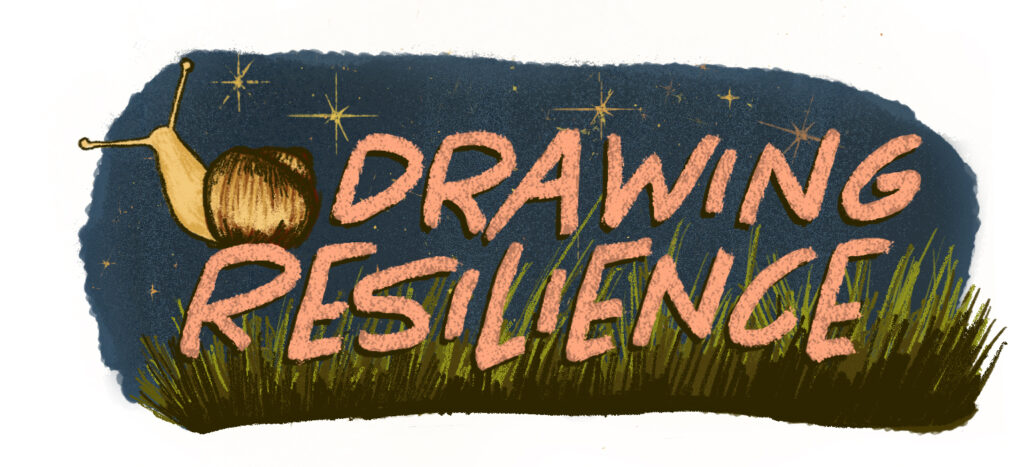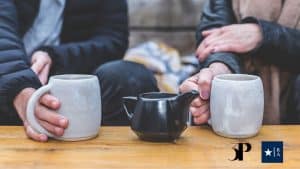
Drawing Resilience: Jaiden Dokken

Illustrations and interview by Nhatt Nichols
Jaiden Dokken, who uses the pronouns they/them, is a writer, printmaker, ceramicist, cidermaker, and self-described highly persistent pen pal. They are Clallam County, Washington’s first Poet Laureate and will spend the next two years bringing poetry to the northwestern-most corner of Washington State.
Dokken’s work has been published in Fiction International, Algorithm, Muses and Vices, SpeakEasy, Superfroot Magazine, and Pile Press. They are an editor and reader for Perennial Press.
Nhatt:
I’m interested to hear what you think of when people say resilience.
Jaiden:
Resilience is the capacity to ride the waves. It’s understanding when I’m having those high highs, and I’m doing great. But the way that life goes is I’m going to be doing not so great in a couple of days or weeks, and not letting that tarnish the joy and the productivity I’m having in the current wave and knowing that it will not always be like this and not letting it sour this moment.
Nhatt:
Is poetry one of the things that can help you build that kind of resilience in yourself?
Jaiden:
Oh, absolutely. I think poetry’s role in resilience is that it breaks us open. It feeds this notion that vulnerability makes us stronger. The more people and stories we feel something for, the more resilient we are to xenophobia and all things under the umbrella of phobia.
Nhatt:
You’re engaging with poetry in a rural community. How are you finding that experience?
Jaiden:
I was surprised by how anxious I was about my inauguration. It’s not my first time talking to people or sharing my work, but I accidentally read some negative comments on the Gazette posting online. That kind of like shook me, speaking of resilience, but walking in, I looked around at all these different people I care about in our community. There were farmers, artists, people in the medical field, and people working for the Jamestown Sklallam tribe, all these different people in that room who like poetry or wanted to support me as a poet.
Nhatt:
You’ve worked hard with the Poet Laureate program to bring more people into poetry. What events have you planned, and who are you hoping to reach?
Jaiden:
It comes from the idea that rural communities aren’t exposed to people with vastly different lived experiences, but that’s no excuse not to actively cultivate our empathy and curiosity. Those skills don’t just happen; we have to work to create emotional bridges between ourselves and those who are different. Poetry is an incredible tool for that, though many people don’t feel like they resonate with poetry as a concept. That’s because the poetry they’ve been exposed to has been so far from their lived reality. We all get exposed to the same old, problematic white men in school, and many people think, ‘This isn’t for me; I didn’t enjoy that.’
My role, especially in this first year, is to throw a ton of different poetry at people so that there might be something that they can hold on to and be like, Oh, I liked that.
Nhatt:
That’s the thing about poetry. You never know when a poem is going to hit you.
You grew up here in Sequim, left, and came back. How has coming back felt different from when you were growing up?
Jaiden
Moving back one week before the pandemic lockdown was impactful. I was planning to have a cidery and do all these big community events, so being shut down it being dangerous to cultivate community was incredibly difficult and jarring. I’ve second-guessed my decision to come back multiple times.
Throughout all these intense things we’ve all been dealing with the past few years, the pandemic, the Black Lives Matter marches and movement, protesting the overturning of Roe v. Wade, and, more joyously, the first-ever Pride marches in Port Angeles, getting to attend and start to organize those events and be connect with people in tumultuous times has been great.
Especially with the pandemic, I put these hard boundaries up for the safety of myself and my loved ones. These relationships feel resilient because I know we will solve the most difficult problems together and show up for each other. It was a pretty rough start moving home, but it has been one of the most beautiful, fruitful experiences in building community. It feels so so so special.
Get this and other rural content in your inbox with the Rural Assembly newsletter.







